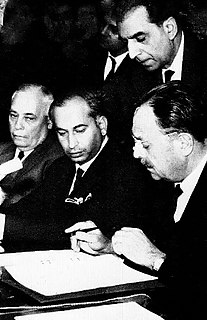Aziz Ahmed may refer to:
- Aziz Ahmed (civil servant), Pakistani civil servant
- Aziz Ahmed (general), Bangladeshi general
Aziz Ahmed may refer to:
Abd al-Aziz, frequently also transliterated Abdul-Aziz, is a male Arabic Muslim given name and, in modern usage, surname. It is built from the words ʽAbd, the Arabic definite article and ʽAzīz "Almighty". The name is commonly abbreviated as "ʽAzīz". The name means "servant of the Almighty", al-ʽAzīz being one of the names of God in Islam, which give rise to the Muslim theophoric names.
Aziz was originally a Northwest Semitic Phoenician-Aramaic-Hebrew-Arabic word, but is now much more commonly known as a Central Semitic Arabic male name. The feminine form of both the adjective and the given name is Aziza.

Aziz Ahmed, HPk, was a career Pakistani statesman and a diplomat during the Cold war, serving in the capacity as 12th Foreign Minister of Pakistan from 1973 until 1977. Prior to that, Ahmad served as the Pakistan Ambassador to the United States (1959–63) and eventually appointed as Foreign secretary (1960–67) by President Ayub Khan.
Abdul is the most frequent transliteration of the combination of the Arabic word Abd and the definite prefix al / el.

Hail Aziz Ahmad al Maythal is a citizen of Yemen, who was held in extrajudicial detention in the United States Guantanamo Bay detention camp, in Cuba. American intelligence analysts estimate that he was born in 1977, in Zemar, Yemen.
Rizwan Ahmed may refer to:

The Sitara-i-Imtiaz ; transl. Star of Excellence, also spelled as Sitara-e-Imtiaz), is the third-highest honour and civilian award in the State of Pakistan. It recognizes individuals who have made an "especially meritorious contribution to the security or national interests of Pakistan, world peace, cultural or other significant public endeavours".
Abdul Ghani or Abdulghani or Abdelghani or similar variants is a male Muslim given name, and in modern usage, surname. It is built from the Arabic words Abd, al- and Ghani. The name means "servant of the All-sufficient", Al-Ghaniyy being one of the names of God in the Qur'an, which give rise to the Muslim theophoric names.

Aftab Ghulam Nabi KaziSPk, SK, also known as AGN Kazi, was a Pakistani civil servant and a bureaucrat during the Cold War and during the post cold war. Kazi was born in Sindh, Bombay Presidency, in 1919 to an academic family. He started his career in the Indian Civil Service in 1944 and served as the Deputy Commissioner of Bihar and Orissa. After the partition of India, Kazi migrated to Pakistan and joined the Provincial Government of Sindh, and held positions such as Secretary of Finance and Secretary to the Governor.

Mahmud Yayale Ahmed, CFR is a Nigerian civil servant and politician who served was Defence Minister of Nigeria.

Mohamed Ould Abdel Aziz is a former Mauritanian politician who was the 8th President of Mauritania, in office from 2009 to 2019. A career soldier and high-ranking officer, he was a leading figure in the August 2005 coup that deposed President Maaouya Ould Sid'Ahmed Taya, and in August 2008 he led another coup, which toppled President Sidi Ould Cheikh Abdallahi. Following the 2008 coup, Abdel Aziz became President of the High Council of State as part of what was described as a political transition leading to a new election. He resigned from that post in April 2009 in order to stand as a candidate in the July 2009 presidential election, which he won. He was sworn in on 5 August 2009. He was subsequently re-elected in 2014, then did not seek re-election in 2019. He was succeeded by Mohamed Ould Ghazouani, who assumed office on 1 August 2019.
Aziz Khan may refer to:
Hijazi, Hijazy, Hejazi or Hegazy is an Arabic surname originally designating a person from the Hejaz region in Saudi Arabia.

Shaikh Nazrul Bakar, also known as S. N. Bakar, was a prominent civil servant of British India and later Pakistan.
Aziz Bagh is a historic residence in Hyderabad, India, was owned by the scholar and senior civil servant Dr Hasanuddin Ahmed, IAS. It was built in 1899 by the Persian and Urdu scholar and poet Aziz Jung Bahadur. In 1997 it was given a Cultural Heritage Award by INTACH, the Indian National Trust for Art and Cultural Heritage.

The Delhi Agreement was a trilateral agreement signed between India, Pakistan and Bangladesh on 28 August 1973; and ratified only by India and Pakistan. It allowed the repatriation of prisoners of war and interned officials held in the three countries after the 1971 Bangladesh Liberation War. The agreement has been criticised for Pakistan's failure to repatriate Urdu-speakers in Bangladesh and not holding to account 195 senior military officials accused of breach of conduct during war.
Faiz Ahmed may refer to:

Aziz Ahmed is a four Star General of Bangladesh who was Chief of Army Staff (CAS) of the Bangladesh Army, in office from 25 June 2018 to 24 June 2021. He has been succeeded by General SM Shafiuddin Ahmed on 24 June 2021.
Kamran Rasool is a retired Pakistani civil servant belonging to the Pakistan Administrative Service who served in BPS-22 grade as the Cabinet Secretary of Pakistan, Chief Secretary Punjab and later on as the Defence Secretary of Pakistan. Rasool was considered to be one of the most influential civil servants during the era of General Pervez Musharraf. Rasool was promoted to the rank of Federal Secretary in May 2003.
Ould is an English surname and an Arabic name. In some Arabic dialects, particularly Mauritanian Arabic, ولد is transliterated as Ould. Most Mauritanian have patronymic surnames.